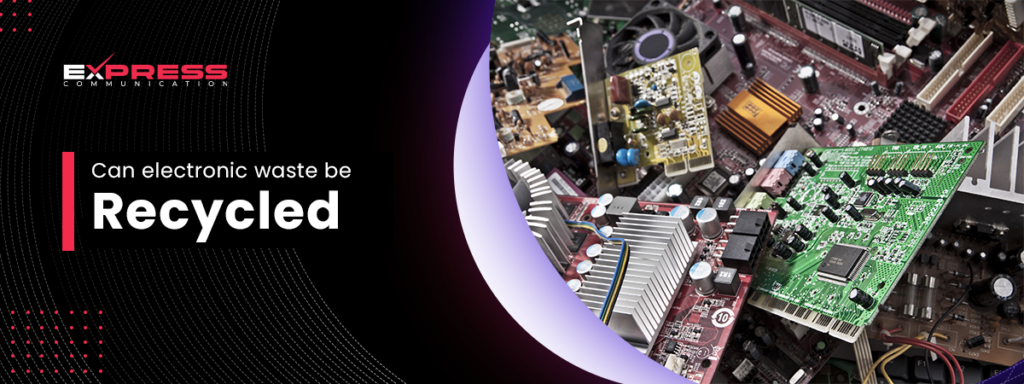
The dilemma brings us to an imperative question: Can electronic waste be recycled? Understanding the recyclability of e-waste is not just about dealing with the surplus of outdated electronics; it’s about embracing responsibility for the planet. This blog aims to shed light on the facets of e-waste recycling, its importance, and the role we all play in this ecological quest.

Table of Contents
Quick Answer: Can Electronic Waste Be Recycled?
The answer is a resounding yes. Most e-waste can be recycled, providing a pathway to reclaim valuable materials and prevent harmful substances from polluting the environment. However, the recyclability of electronic waste hinges on several factors, including the technology available at recycling facilities, the design of the electronic item, and the presence of hazardous materials. Effective recycling requires a collective effort from manufacturers, recycling facilities, and consumers.
What is Electronic Management and Recycling?
Electronic recycling, or e-waste recycling, is the process of reclaiming materials from old and obsolete electronic devices. This procedure is not just about dismantling; it’s a sophisticated recycling system that aims to recover valuable materials like copper, gold, and aluminum while safely disposing of hazardous substances such as lead and mercury. The ultimate goal of e-waste recycling is to minimize the environmental impact of discarded electronics and promote a sustainable circular economy.
Read more here: What is Electronic Management and Recycling?
What Happens If E-Waste Isn’t Recycled?
The consequences of not recycling e-waste are dire. Unrecycled e-waste often ends up in landfills, where hazardous substances can leach into the soil and water, posing severe risks to human health and the environment. Moreover, failing to recycle e-waste means losing valuable materials which could have been recovered and reused, leading to more mining and extraction of finite natural resources.
Electronic Items That Can Be Recycled
Common Recyclables
- Mobile Phones and Tablets: These are among the most frequently recycled items, owing to their high content of valuable metals.
- Computers and Laptops: Management and Recycling these devices not only recovers precious metals but also plastics and glass.
- Printers and Cartridges: These can be refurbished or recycled to reclaim plastics, metals, and sometimes residual ink.
Specialty Items
- Batteries and Chargers: Specialized recycling processes recover metals and ensure safe disposal of hazardous components.
- Televisions and Monitors: Those with cathode ray tubes, especially, require careful handling due to the presence of lead.
Electronic Items That Can Not Be Recycled
While many electronic items can be recycled, certain components pose challenges:
- Light Bulbs: While some types of light bulbs can be recycled, others, especially those containing mercury, require specific handling.
- Severely Damaged Electronics: Devices that are severely damaged, especially those with leaked batteries, may be deemed hazardous and not suitable for traditional recycling processes.

What Happens To E-Waste At A Management and Recycling Plant?
The journey of e-waste through a recycling plant is a testament to modern recycling innovation and environmental stewardship. Here’s a step-by-step breakdown:
Collection and Transportation
First, e-waste is collected from various drop-off centers and transported to recycling facilities. This step is crucial in preventing e-waste from ending up in landfills.
Manual Sorting and Disassembly
Upon arrival, items are manually sorted. This initial separation is vital for identifying items that can be refurbished or require specific recycling processes. Subsequently, workers disassemble devices to segregate hazardous materials from recyclable ones.
Shredding and Separation
Devices are then shredded into small pieces, allowing for the easier extraction of valuable materials. Advanced separation technologies are employed to sort the shredded pieces into various material categories like metals, plastics, and glass.
Material Recovery
Through processes like magnetic separation, eddy current separation, and water separation, different materials are recovered with remarkable efficiency. Metals are sent to smelters, plastics are often repurposed for new products, and glass is processed for reuse.
What Can E-Waste Management and Recycling Be Turned Into?
The transformation of e-waste into new products is a key component of the recycling process. Here are some of the remarkable uses of recovered materials:
- Metals: Recovered metals like gold, silver, and copper find their way back into the electronics industry, being used in the manufacturing of new electronic components and devices.
- Plastics: Recycled plastics from e-waste can be turned into a variety of products, from automotive parts to garden furniture, demonstrating the versatility of recycling.
- Glass: The glass recovered, especially from older TVs and monitors, is used in new electronic screens, tiles, and even in the construction industry.
Final Thoughts
The question of whether electronic waste can be recycled finds its answer in the affirmative, with the caveat that success hinges on our collective efforts. The e-waste recycling process not only mitigates the environmental impact of our digital age but also conserves valuable resources and fosters innovation in recycling technologies. As consumers, we hold the power to influence this cycle positively by responsibly disposing of our electronic waste and choosing products designed with recyclability in mind. The path to a sustainable future is paved with recycled e-waste, and each of us plays a pivotal role in this journey.




